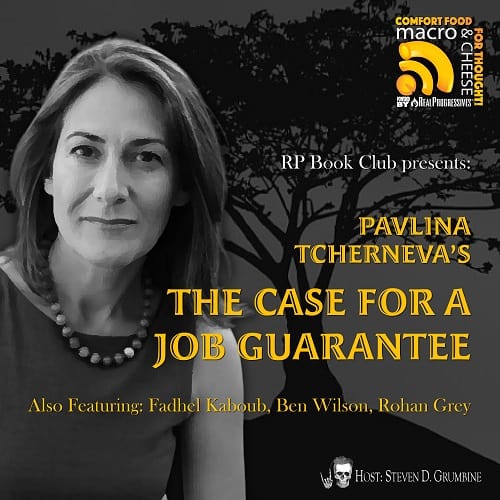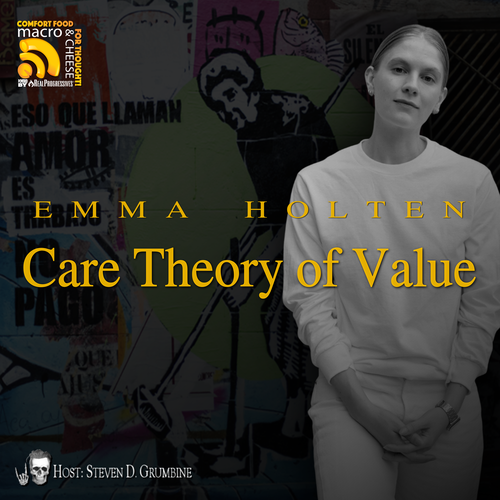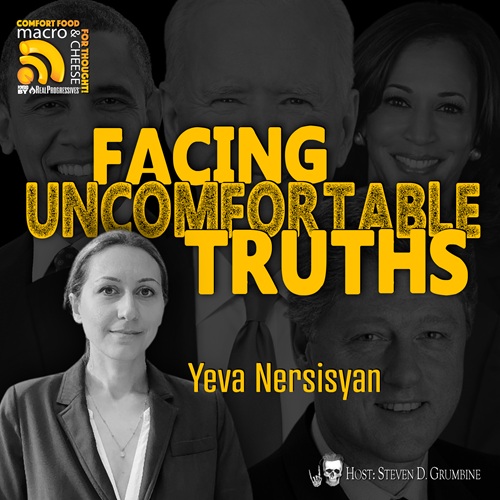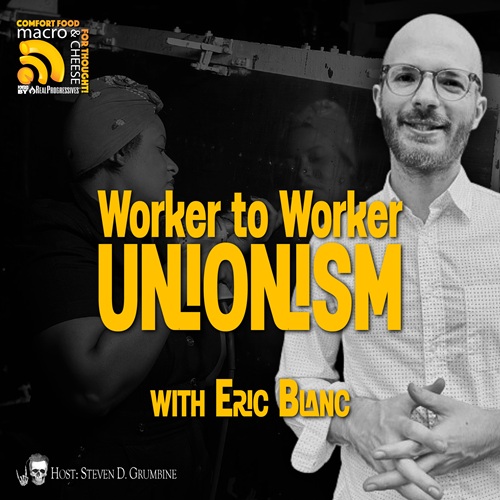Episode 238 – RP Book Club Presents: Pavlina Tcherneva’s The Case For a Job Guarantee

FOLLOW THE SHOW
Four weeks of RP Book Club in one episode. The Case for a Job Guarantee, by Pavlina R Tcherneva. Featuring Fadhel Kaboub, Ben Wilson, Rohan Grey, and the author herself.
RP Book Club spent four weeks on The Case for a Job Guarantee, by Pavlina R. Tcherneva. Each week featured a different guest expert who led the discussion and answered questions. Listeners to this podcast will recognize their names, including Pavlina herself, Fadhel Kaboub, Ben Wilson, and Rohan Grey. We were also honored to have Bill Black and June Carbone join in.
For this episode, Macro N Cheese is releasing the audio recording of all four sessions. Since it is unusually long, the time codes for each segment are included below.
[00:03:09 – 01:55:41] Session One
Guest: Fadhel Kaboub
- Introduction
- Chapter 1, “A Public Option for Good Jobs”
- Chapter 2, “A Steep Price for a Broken Status Quo”
[01:55:41 – 03:17:41] Session Two
Guest: Pavlina Tcherneva
- Chapter 3, “The Job Guarantee, a New Social Contract and Macroeconomic Model”
- Chapter 4, “But How Will You Pay for It?”
[03:18:44 – 04:41:57] Session Three
Guest: Ben Wilson
- Chapter 5, “What, Where, and How: Jobs, Design, and Implementation”
[04:41:57 – 06:29:43] Session Four
Guest: Rohan Grey
- Chapter 6, “The Job Guarantee, the Green New Deal, and Beyond”
Use this link to order a copy of The Case for a Job Guarantee, by Pavlina R. Tcherneva
Dr. Fadhel Kaboub is Under-Secretary-General for Financing for Development of the Organisation of Educational Cooperation (OEC). He is an Associate Professor of Economics (on leave) at Denison University and President of the Global Institute for Sustainable Prosperity.
@FadhelKaboub on Twitter
Pavlina R. Tcherneva is an Associate Professor of Economics at Bard College, the Director of OSUN’s Economic Democracy Initiative, and a Research Scholar at the Levy Economics Institute, NY. She specializes in modern money and public policy. Find her work at pavlina-tcherneva.net
@ptcherneva on Twitter
Benjamin C. Wilson is an Associate Professor of Economics at the State University of New York at Cortland and a research scholar at the Global Institute for Sustainable Prosperity.
@autogestion77 on Twitter
Rohan Grey is an Assistant Professor of Law at Willamette University in Salem, Oregon, and the founder and president of the Modern Money Network. MintTheCoin.org
@rohangrey on Twitter
Due to the length of the episode, we will not be publishing the transcript on the website.
“I tend to think of it as there is a whole lot of private sector employment out there that is very much dependent on the government subsidy, on the procurement, on the investment subsidies, on the tax benefits and the like, and so from there you can ask yourself, well, why can’t the government do just a bit more, just a little extra to finish the job, if you will, and make sure that we have provided employment for all.”
~Pavlina Tcherneva, Macro N Cheese Episode 238, “Full Employment”
GUEST EXPERTS’ BIOS AND BOOK SECTIONS DISCUSSED
Fadhel Kaboub
- Introduction,
- Chapter 1, “A Public Option for Good Jobs,”
- Chapter 2, “A Steep Price for a Broken Status Quo”
Fadhel Kaboub is an Associate Professor of economics at Denison University, the President of the Global Institute for Sustainable Prosperity, and the Under Secretary General for Financing for Development with The Organization of Educational Cooperation in Addis Ababa, Ethiopia.
https://denison.edu/news-events/featured/148775
https://denison.edu/news-events/featured/148775
@FadhelKaboub on Twitter
Pavlina Tcherneva
- Chapter 3, “The Job Guarantee, a New Social Contract and Macroeconomic Model”
- Chapter 4, “But How Will You Pay for It?”
Pavlina Tcherneva is an Associate Professor of Economics at Bard College, the Director of OSUN’s Economic Democracy Initiative, and a Research Scholar at the Levy Economics Institute, NY. She specializes in modern money and public policy.
https://pavlina-tcherneva.net/about/
@ptcherneva on Twitter
Ben Wilson
- Chapter 5, “What, Where, and How: Jobs, Design, and Implementation”
Benjamin Wilson is an associate professor of economics at the State University of New York College Cortland and a research scholar with the Global Institute of Sustainable Prosperity. He has published in the American Review of Political Economy and the Forum for Social Economics.
Ben is also a Union area activist and delegate for the Cortland Chapter of United University Professions.
https://cortland.academia.edu/BWilson
@autogestion77 on Twitter
Rohan Gray
- Chapter 6, “The Job Guarantee, the Green New Deal, and Beyond.”
Rohan Gray is an Assistant Professor of Law at Willamette University and author whose research focuses on the design and regulation of digital fiat currency. He is the President of the Modern Money Network, the Research Director of the Digital Fiat Currency Institute, and a consultant to the International Telecommunications Union’s Focus Group on Digital Currency.
https://positivemoney.org/rohan-grey/
@rohangrey on Twitter
PEOPLE MENTIONED
Jason Hickel
Dr. Jason Hickel is an economic anthropologist, author, and a Fellow of the Royal Society of Arts. He is Professor at the Institute for Environmental Science and Technology at the Autonomous University of Barcelona, Visiting Senior Fellow at the International Inequalities Institute at the London School of Economics, and Chair Professor of Global Justice and the Environment at the University of Oslo. His research focuses on global political economy, inequality, and ecological economics.
Ndongo Samba Sylla
is a Senegalese development economist. He has previously worked as a technical advisor at the Presidency of the Republic of Senegal, and is Programme manager at the West Africa office of the Rosa Luxemburg Foundation.
https://www.linkedin.com/in/dr-ndongo-samba-sylla-528b0b155/?originalSubdomain=sn
Mathew Forstater
is a professor in Economics at the University of Missouri/Kansas City and the Research Director of the Global Institute for Sustainable Prosperity. having received a Ph.D. at The New School for Social Research. His research focuses on the History of Economic Thought, Economic Methodology, Political Economy, Public Policy, Economics of Discrimination, Environmental Economics, African and African American Economic History.
https://shss.umkc.edu/profiles/economics/mathew-forstater.html
https://www.global-isp.org/people/mathew-forstater-ph-d/
Clara Mattei
is an Assistant Professor in the Economics Department of The New School for Social Research, and was a 2018-2019 member of the School of Social Sciences at the Institute for Advanced Studies. Dr. Mattei’s focus is primarily on post-WWI monetary and fiscal policies, and the history of economic thought and methodology.
John Maynard Keynes
was an early 20th-century British economist, best known as the founder of Keynesian economics and the father of modern macroeconomics. One of the hallmarks of Keynesian economics is that governments should actively try to influence the course of economies.
https://www.investopedia.com/terms/j/john_maynard_keynes.asp
https://www.britannica.com/biography/John-Maynard-Keynes
INSTITUTIONS / ORGANIZATIONS
Federal Reserve
The Federal Reserve System is the central bank of the United States. Founded by an act of Congress in 1913, the Federal Reserve’s primary purpose was to enhance the stability of the American banking system.
https://www.federalreservehistory.org/essays/federal-reserve-history
Bureau of Labor Statistics
is a federal government agency that measures labor market activity, working conditions, and price changes in the economy.
Economic Democratic Initiative
is the Bard College Open Society University Network’s collaborative program focusing on the structural determinants of economic insecurity. Its projects examine the connections between inequality, unemployment and poverty and the policy space and financing capacities of governments to address these challenges.
International Monetary Fund (IMF)
is a major financial agency of the United Nations, and an international financial institution claiming it’s mission to be “working to foster global monetary cooperation, secure financial stability, facilitate international trade, promote high employment and sustainable economic growth, and reduce poverty around the world.”
https://en.m.wikipedia.org/wiki/International_Monetary_Fund
Organization for Economic Co-operation and Development (OECD)
is an intergovernmental organization with 38 member countries, founded in 1961 to stimulate economic progress and world trade.
https://en.wikipedia.org/wiki/OECD
EVENTS
Great Depression
Was a worldwide economic downturn, originating in the United States, that began in 1929 and lasted until about 1939. It was the longest and most severe depression ever experienced by the industrialized Western world, sparking fundamental changes in economic institutions, macroeconomic policy, and economic theory.
https://www.britannica.com/event/Great-Depression
New Deal
was a series of domestic programs initiated and developed the administration of President Franklin D. Roosevelt (FDR) between 1933 and 1939, which took action to bring about immediate economic relief as well as reforms in industry, agriculture, finance, waterpower, labour, and housing, vastly increasing the scope of the federal government’s activities.
https://www.britannica.com/event/New-Deal
CONCEPTS
Federal Job Guarantee
The job guarantee is a federal government program to provide a good job to every person who wants one. The government becoming, in effect, the Employer of Last Resort.
The job guarantee is a long-pursued goal of the American progressive tradition. In the 1940s, labor unions in the Congress of Industrial Organizations (CIO) demanded a job guarantee. Franklin D. Roosevelt supported the right to a job in his never-realized “Second Bill of Rights.” Later, the 1963 March on Washington demanded a jobs guarantee alongside civil rights, understanding that economic justice was a core component of the fight for racial justice.
https://www.sunrisemovement.org/theory-of-change/what-is-a-federal-jobs-guarantee/
https://www.currentaffairs.org/2021/05/pavlina-tcherneva-on-mmt-and-the-jobs-guarantee
Federal Job Guarantee Frequently Asked Questions
https://pavlina-tcherneva.net/job-guarantee-faq/
Inflation/Hyperinflation
is a term to describe rapid, excessive, and out-of-control general price increases in an economy.
https://www.investopedia.com/terms/h/hyperinflation.asp
Gig Labor
Non-standard or gig work consists of income-earning activities outside of standard, long-term employer-employee relationships.
https://www.gigeconomydata.org/basics/what-gig-worker
Aggregate Demand
is a term used in macroeconomics to describe the total demand for goods produced domestically, including consumer goods, services, and capital goods.
The non-accelerating inflation rate of unemployment (NAIRU)
is the specific level of unemployment that is evident in an economy that does not cause inflation to increase.
https://www.investopedia.com/terms/n/non-accelerating-rate-unemployment.asp
Rust Belt
is a region of the United States that experienced industrial decline starting in the 1950s. The U.S. manufacturing sector as a percentage of the U.S. GDP peaked in 1953 and has been in decline since, impacting certain regions and cities primarily in the Northeast and Midwest regions of the United States.
https://en.wikipedia.org/wiki/Rust_Belt
Automation
describes a wide range of technologies that reduce human intervention in processes, namely by predetermining decision criteria, subprocess relationships, and related actions, as well as embodying those predeterminations in machines.
https://en.wikipedia.org/wiki/Automation
Capitalism
is often thought of as an economic system in which private actors own and control property in accord with their interests, and demand and supply freely set prices in markets in a way that can’ ostensibly, serve the best interests of society.
https://www.imf.org/external/pubs/ft/fandd/2015/06/basics.htm
https://www.thebalancemoney.com/capitalism-characteristics-examples-pros-cons-3305588
Wage Labor
in Marxist thought, is a mode of production in which the laborer sells their capacity to work as a commodity.
Economic Stimulus
Economic stimulus is action by the government to encourage private sector economic activity. To stimulate the economy, the government adopts targeted, expansionary policies. Economic stimulus may be related to monetary policy carried out by the Federal Reserve. Other forms of economic stimulus are driven by fiscal policy, with lawmakers directing tax policies and government spending toward areas they believe will jumpstart the economy.
https://www.investopedia.com/terms/e/economic-stimulus.asp
Gross Domestic Product (GDP)
is a monetary measure of the market value of all the final goods and services produced and sold in a specific time period by a country or countries.
https://en.wikipedia.org/wiki/Gross_domestic_product
Entitlement (Economic)
is, generally, any government-provided or government-managed benefit or service to which some or all individuals are entitled by law.
https://www.britannica.com/money/entitlement
Debt Ceiling
The debt limit is the total amount of money that the United States government is authorized to borrow to meet its existing legal obligations, including Social Security and Medicare benefits, military salaries, interest on the national debt, tax refunds, and other payments.
https://www.investopedia.com/terms/d/debt-ceiling.asp
https://stephaniekelton.substack.com/p/the-debt-ceiling-limit-is-destructive
Neoliberalism
is now generally thought to label the philosophical view that a society’s political and economic institutions should be robustly liberal and capitalist, but supplemented by a constitutionally limited democracy and a modest welfare state.
https://plato.stanford.edu/entries/neoliberalism/
Title Labor Market
The four types of labor in economics are skilled, unskilled, semi-skilled, and professional. Together, these four types of labor make up the active labor force.
Modern Monetary Theory (MMT)
is a heterodox macroeconomic supposition that asserts that monetarily sovereign countries (such as the U.S., U.K., Japan, and Canada) which spend, tax, and borrow in a fiat currency that they fully control, are not operationally constrained by revenues when it comes to federal government spending.
Put simply, modern monetary theory decrees that such governments do not rely on taxes or borrowing for spending since they can issue as much money as they need and are the monopoly issuers of that currency. Since their budgets aren’t like a regular household’s, their policies should not be shaped by fears of a rising national debt, but rather by price inflation.
https://www.investopedia.com/modern-monetary-theory-mmt-4588060
https://gimms.org.uk/fact-sheets/macroeconomics/
Labor Flow
refers to worker hires and separations.
https://www.sciencedirect.com/science/article/abs/pii/S0304393211001000
Automatic Stabilizers
are mechanisms built into government budgets, without any vote from legislators, that increase spending or decrease taxes when the economy slows.
https://www.brookings.edu/blog/up-front/2019/07/02/what-are-automatic-stabilizers/
The Global South
refers broadly to regions of Latin America, Asia, Africa, and Oceania. It is one of a family of terms, including “Third World” and “Periphery,” that denote regions outside Europe and North America, mostly (though not all) low-income and often politically or culturally marginalized. The use of the phrase Global South marks a shift from a central focus on development or cultural difference toward an emphasis on geopolitical relations of power.
https://journals.sagepub.com/doi/pdf/10.1177/1536504212436479
Currency Issuer/User
As a major component of Modern Money thought, understanding the difference between an issuer of its own sovereign currency: nations such as the United States, the United Kingdom, Japan, Australia, etc, and any entity that must use the sovereign currency of the issuer: a state, a business, a family, an individual, is key to understanding modern fiat currency systems as a whole. It must be acknowledged that a currency issuer is not constrained by taxation or borrowing as a limit to currency issuance and should not be fiscally limited in providing for the common good.
Capital Order
Clara Mattei, in her book The Capital Order, asserts the primacy of capital over labor in the hierarchy of social relations within the capitalist production process. That primacy was threatened after World War I in what she describes as the greatest crisis in the history of capitalism. Among the concepts the author discusses is a so called “Trinity of Austerity” through which the Capital Order asserts dominance over labor by the combination of Monetary (interest rate increase), Fiscal (reductions in spending for social need), and Industrial (layoff, wage/work hours reduction) Austerity with the desired, yet implicit, intention of increasing tension, and therefore pliability, among the working classes.
PUBLICATIONS
The Case for a Job Guarantee by Pavlina R Tcherneva
More of Pavlina’s work can be found here:
https://realprogressives.org/modern-monetary-theory/
https://realprogressives.org/matt-yglesias-is-wrong-job-guarantee-vs-basic-income/
https://prospect.org/economy/controlling-viral-spread-of-unemployment-with-a-job-guarantee/
https://realprogressives.org/mmt-models-multidisciplinarity/
https://realprogressives.org/monopoly-money-the-state-as-a-price-setter/
https://realprogressives.org/the-debt-ceiling-and-americas-stockholm-syndrome/
Related Podcast Episodes
Related Articles

How to Make a Po’boy

Modern Monetary Theory Without Class Struggle is Just Accounting






